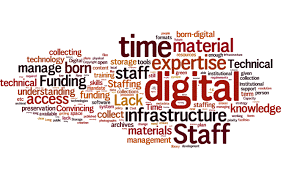The Digital Age: Disruption or Opportunities?
One of the mega-drivers of change, “New Knowledge”, covers our new digital age, where computers and the internet, if they haven’t already done so, are steadily taking over much of our lives. Frequent media headlines shout out about how jobs are being taken over by increased use of digital devices of one sort or another. New technology displacing jobs is nothing new of course. The beginning of the industrial age saw the emergence of Luddite movement in the UK (see Wikipedia), where people were actually shot for protesting against the introduction of new technology. In my working life, I’ve seen typing pools disappear and cash being replaced by ‘plastic fantastic’ cards and digital money, to name but two changes. I’ve not heard of anyone being shot for protesting. Indeed, now, many people eagerly look forward to the latest digital gadgets coming into the shops, and about 95% of money transactions in developed countries, is in digital form.
I’ve recently had a personal experience of the digital take-over. I’ve just finished having a novel written, printed and self published using technology not available even a few years ago. Even to say I wrote it is a misnomer. I ‘said it’ to a computer program which converted my speech into written text, with fewer mistakes than if I had been doing the typing myself. An independent professional editor, and a small independent printing company did the rest, without going anywhere near the conventional publishing establishment. The hard-copy book is even being sold online by the printer and myself, as well as in bookstores. Those who don’t buy books these days, can even get the story in digital (eBook) form from the book’s printer, “Yourbooks”. (“Flight of the Tui”, if you’re interested. It’ll be out in a couple of weeks, and is a great read, even if I say so myself).
In some aspects of the digital technology uptake, though, as a country we’re proving to be a little backward. City people, as well as central and local government, continue to fill the headlines with traffic problems, especially at rush hour. The arguments and suggested solutions nearly always revolve around transport infrastructure, and literally billions of dollars are being spent, often resulting in traffic jams just being transferred from one part of the system to another. Most of the drivers of the cars are office workers of one sort or another, going from home to work to sit behind a computer all day. They could just as easily be seated behind a computer outside of the various central business districts, nearer to their home, if not at home, for at least three days a week. Better internet technology uptake, changes in management techniques to manage on work output rather than ‘whose behind their desks’ management styles, are now needed to ensure money spent is in the right place, rather than being wasted on major transport infrastructure projects.
Internet technology infrastructure in rural areas is also a far better place to spend money. Small rural towns which lost much of their economic vitality as roads and transport systems improved about sixty years ago, and many employers moved to larger cities, could be revitalized by having wi-fi in homes and small local businesses. Low-cost wireless technology has been around for some time now, enabling this to happen, but it hasn’t been widely taken up. It’s another example of not being as smart as we could be. It’s one thing being able to buy the latest digital gadgets when they hit the shops in the bigger towns and cities, but some people and some places can’t afford to do so, or the technology infrastructure isn’t in place to enable the gadgets to work. Some of the money spent on transport infrastructure would be better spent on digital technology structure, and associated technology learning opportunities. It’s a changing world out there. We can keep up and organize ourselves to take advantage of changes like the digital age. It’s just a matter of seeing the opportunities for improving our collective NZ lifestyles, and carrying out constructive work to make it happen. The choices are ours to make, at all levels of our national society.

Leave a Reply